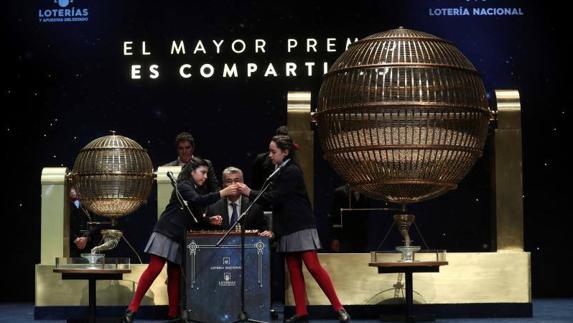Spain holds its breath and hopes for the Gordo
22 December: The special Christmas Lottery Draw
Debbie Bartlett
Viernes, 22 de diciembre 2017, 11:26
There is always an air of great excitement and anticipation in Spain on 22 December, because it is the day of the Christmas Lottery, known as El Gordo, meaning The Fat One, although the nickname refers to the first prize rather than the lottery itself.
It is hardly surprising that people hope for a win: this is the biggest lottery in the world in terms of prize money, totalling over two billion euros and with the main winner receiving around four million. Around 75 per cent of adults in Spain are believed to buy a ticket or a décimo, a fraction of one-tenth, for El Gordo, in the hope of making a fortune.
In 1967, there was great rejoicing in Malaga when it became known that tickets for the first prize, over 600 million pesetas, had all been bought in the city. The winning number was 43758.
The Sorteo de Navidad, as it is officially known, is the second longest-running national lottery in the world, beaten only by the Dutch Staatsloterij, which began in 1726. The Spanish lottery continued all through the Civil War (1936 - 1939) although 1938 was unusual because there were two of them. Both took place on 22 December, but one was republican and drawn in Barcelona, and the other nationalist and was held in Burgos.
However, the Spanish Christmas lottery has not always been held on the same date. It began on 18 December 1812 (18/12/1812), and was the idea of the exiled government, which at the time was based in Cadiz, as a way of raising money to cover the costs of fighting Napoleons troops during the Peninsular War. It was held on different dates in December after that, and it was not until 1893 that it was held on 22nd for the first time.
The winning numbers are sung, rather than spoken, by pupils from San Ildefonso school (originally, it was an orphanage) and until 1913 the numbers were printed on paper. From then onwards, the system of wooden balls which is still in use today was introduced.
For the past seven years the draw has taken place at the Royal Theatre in Madrid; prior to that it was held at the Spanish parliament.
Tickets for the very first Christmas lottery cost 40 reales. In 1944 they were 100 pesetas and by 1953 the price had doubled, to 200. It doubled yet again, to 400 pesetas, in 1957, and by 1970 people were paying 1,000 pesetas. Now, a décimo for El Gordo costs 20 euros.
Statisticians say that 85 per cent of those who buy a ticket for the Christmas lottery will not win anything, but it doesnt put people off. El Gordo is part of Spanish history and tradition, and the anticipation and excitement are all part of Christmas in Spain.
